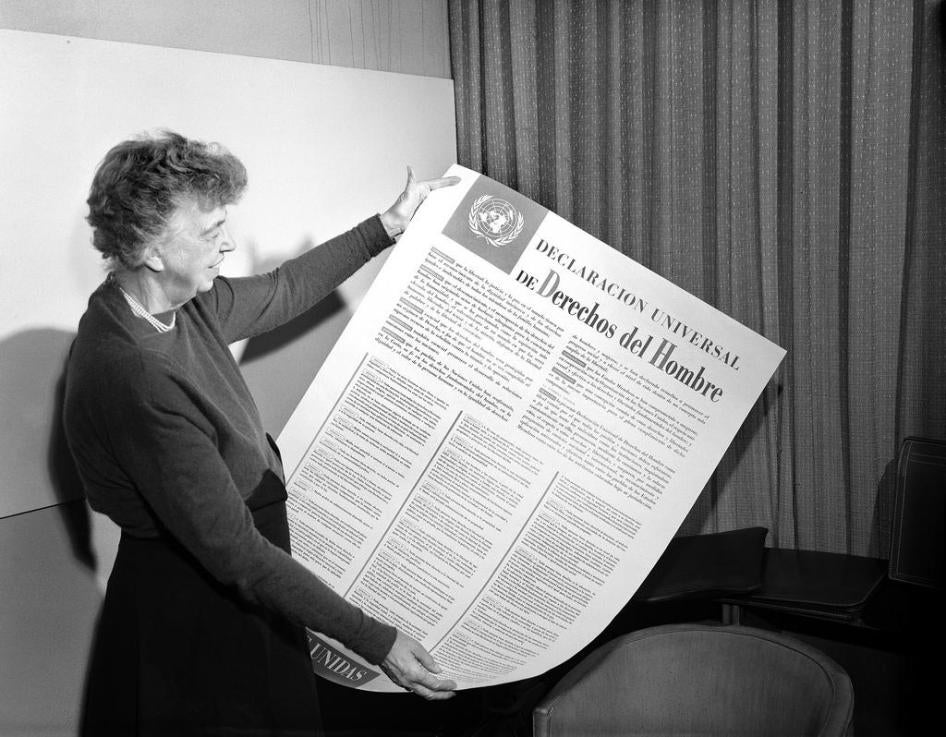Today we celebrate the 70th anniversary of a living document. Living not because it evolves and adapts to new times through amendments, like a Constitution, but because the values it enshrines and the promise it holds are as relevant today as when the General Assembly of the United Nations adopted it amid the ashes of World War II.
The Universal Declaration of Human Rights became seminal because it enshrined a simple yet powerful idea: All human beings are entitled to the same fundamental rights and freedoms, regardless of race, sex, creed, or any other distinction. That is the “universal” in the declaration´s name, which means that those rights and freedoms apply to the people of any country, whether it is a dictatorship or a democracy, or whether its government is of the right or of the left.
The declaration´s first article states that “all human beings are born free and equal in dignity and rights.” Those twelve words portended a seismic shift in a world where some people — royalty, the rich, Europeans, white people, men — had always enjoyed more rights and benefits than others. And they remain acutely pertinent today in Brazil.
When article 3 of the Declaration says that everyone has the right to life, liberty and security, it means the privileged elite but also those who live in slums.
When article 5 says that nobody will be subject to torture or mistreatment, it does not make an exception for people suspected of being leftists during the past military regime, or for the poor young people some police officers think they can beat or kill with impunity. Those who torture, in the past or now, should never be treated as heroes, but instead brought to justice.
When article 19 says that all human beings have the right to freedom of opinion and expression, it does not exclude military police officers, who in Brazil are can be subjected to disproportionate punishments if they advocate police reform or criticize a superior officer or a government decision.
And when article 23 says that all human beings have the right to equal pay for equal work, it includes women, who in Brazil continue to earn far less than men who have the same level of education.
Brazil has made progress defending some of the rights contained in the Declaration. The National Council of Justice (CNJ), for example, is trying to put into practice the right to a fair and public hearing by establishing that all detainees must be taken before a judge within 24 hours of arrest. Yet, despite the CNJ’s order, more than half of detainees languish in jail cells for as long as several months before seeing a judge, the CNJ itself told us.
Other universal human rights face renewed threats in Brazil. Article 14 recognizes the right to seek asylum in other countries, but some Brazilian politicians advocate closing the borders to Venezuelans fleeing their collapsing nation, even to those escaping persecution.
Article 26 states that education “shall be directed to the full development of the human personality and to the strengthening of respect for human rights and fundamental freedoms.” That provision is in conflict with the “School without Party” bill currently under examination in Congress, which would prohibit not just discussion, but even using the terms “gender” and “sexual orientation” in the classroom.
The Universal Declaration itself is not binding, but today its principles are broadly reflective of customary international law that all nations should adhere to, and its provisions were later included in several treaties with which Brazil has a legal obligation to comply.
Ten years after the proclamation of the Declaration, the former US first lady Eleanor Roosevelt, who had chaired the commission that drafted it, asked in a speech where universal human rights begin. “In small places,” she answered, “close to home - so close and so small that they cannot be seen on any maps of the world.” It was, of course, before Google Maps existed.
But her point stands. The Universal Declaration is unlike any previous international agreement, which dealt with borders or trade or other relations between countries. The Declaration is about each and every human being.
The violation of fundamental rights in any corner of the planet erodes the principles that protect us all from abuse and tyranny. That is why we should cherish and defend the Declaration that put us, the people, at the center of international relations.










